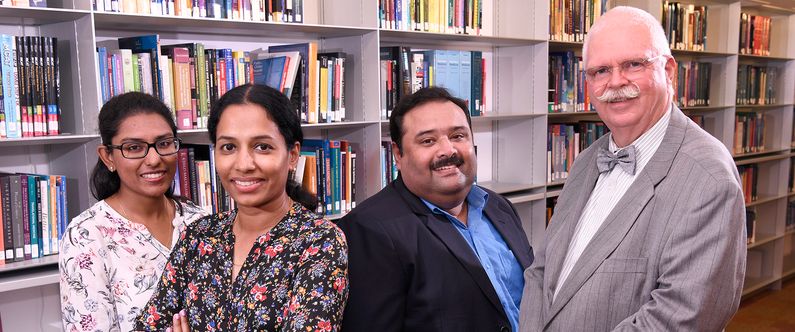WCM-Q research probes link between diabetes and breast cancer
 From Left to right: Sharon Varghese, Elizabeth Varghese, Dr. Samson Mathews Samuel, Dr. Dietrich Büsselberg.
From Left to right: Sharon Varghese, Elizabeth Varghese, Dr. Samson Mathews Samuel, Dr. Dietrich Büsselberg.
Researchers at Weill Cornell Medicine-Qatar (WCM-Q) have explored the links between type 2 diabetes and breast cancer in a new paper published in Cancer Treatment Reviews, a leading scientific journal.
The researchers, led by Dr. Dietrich Büsselberg, carried out a comprehensive review of a range of more than 200 existing diabetes and breast cancer studies, concluding that women with diabetes not only appear to have an increased risk of developing breast cancer, but also that diabetes supports breast cancer progression and can negatively impact the effectiveness of anti-cancer therapies.
The paper, entitled ‘Challenges and perspectives in the treatment of diabetes associated breast cancer’, also inferred that managing diabetes and treating cancer using a combination of anti-diabetic and anti-cancer drugs is likely to be more effective in the treatment of diabetes-associated cancers.
The World Health Organization estimates that the number of people with type 2 diabetes worldwide rose from 108 million in 1980 to 422 million in 2014. The condition is characterized by the body becoming resistant to the effects of insulin, a hormone produced by the beta-cells of the pancreas that keeps blood glucose levels under control. While it is well known that high blood glucose can cause damage to the heart, nerves, kidneys and eyes, the link between diabetes and cancer, although evident, is less well understood.
Dr. Büsselberg, professor of physiology and biophysics at WCM-Q, said: “A vast amount of research has been published about type 2 diabetes and breast cancer separately, but not so much in regard to the links between the two. Therefore, we decided to bring research into both diseases together in one review to improve our understanding of their interactions. We believe this review indicates there is indeed a direct link between diabetes and increased breast cancer risk, its progression, metastasis and relapse. Better understanding of this link will be extremely beneficial to patients, hopefully improving survival rates and the quality of life among affected individuals.”
The study explains that as diabetes progresses the body’s metabolism undergoes fundamental changes, with elevated levels of lipids (fats), insulin and glucose in the blood. These metabolic changes in turn disrupt and alter the normal functions of cells, causing damage to the DNA and the cell’s own structures, uncontrolled cell proliferation, and inhibition of a process called apoptosis, a normal form of programmed cell death that is a key part of cellular development and renewal. Inhibition of apoptosis in breast cancer cells serves to initiate or promote the growth of breast tumors.
Dr. Samson Mathews Samuel, the first author of the new review, said: “With diabetes a ‘metabolic reprogramming’ takes place, changing the way the cell functions as it attempts to cope with the abnormal levels of lipids, insulin and glucose in circulation. This reprogramming alters the very intricate processes of cell signaling in normal breast cells, and this disruption of normal cellular function can contribute to the incidence, progression and aggressiveness of breast cancer. In straightforward terms, diabetes disrupts normal cell function and makes cancer more likely.”
The study also discusses the effects of diabetes therapies on cancer risk, finding that drugs that target high blood glucose appear to induce cell death in cancer cells. While insulin therapy appears to increase breast cancer risk and support breast cancer progression, drugs that increase the body’s sensitivity to insulin, such as the widely prescribed metformin, have significant anti-cancer potential.
Dr. Büsselberg said: “Studies have shown that metformin, which is the most widely prescribed oral anti-diabetic drug, decreases the occurrence of cancer in diabetes patients and also may increase the effectiveness of anti-cancer drugs for cancer patients. More research is now needed to determine how diabetes and breast cancer are linked, and how best to use anti-diabetic and anti-cancer drugs in combination to improve patient outcomes.”
The study was also worked on by senior research specialist Elizabeth Varghese and research specialist Sharon Varghese, both of WCM-Q. The work was supported by a Bridge Funding Grant (Nov 2017- current) awarded to Dr. Büsselberg by the BMRP program at Weill Cornell Medicine-Qatar, a program funded by Qatar Foundation.